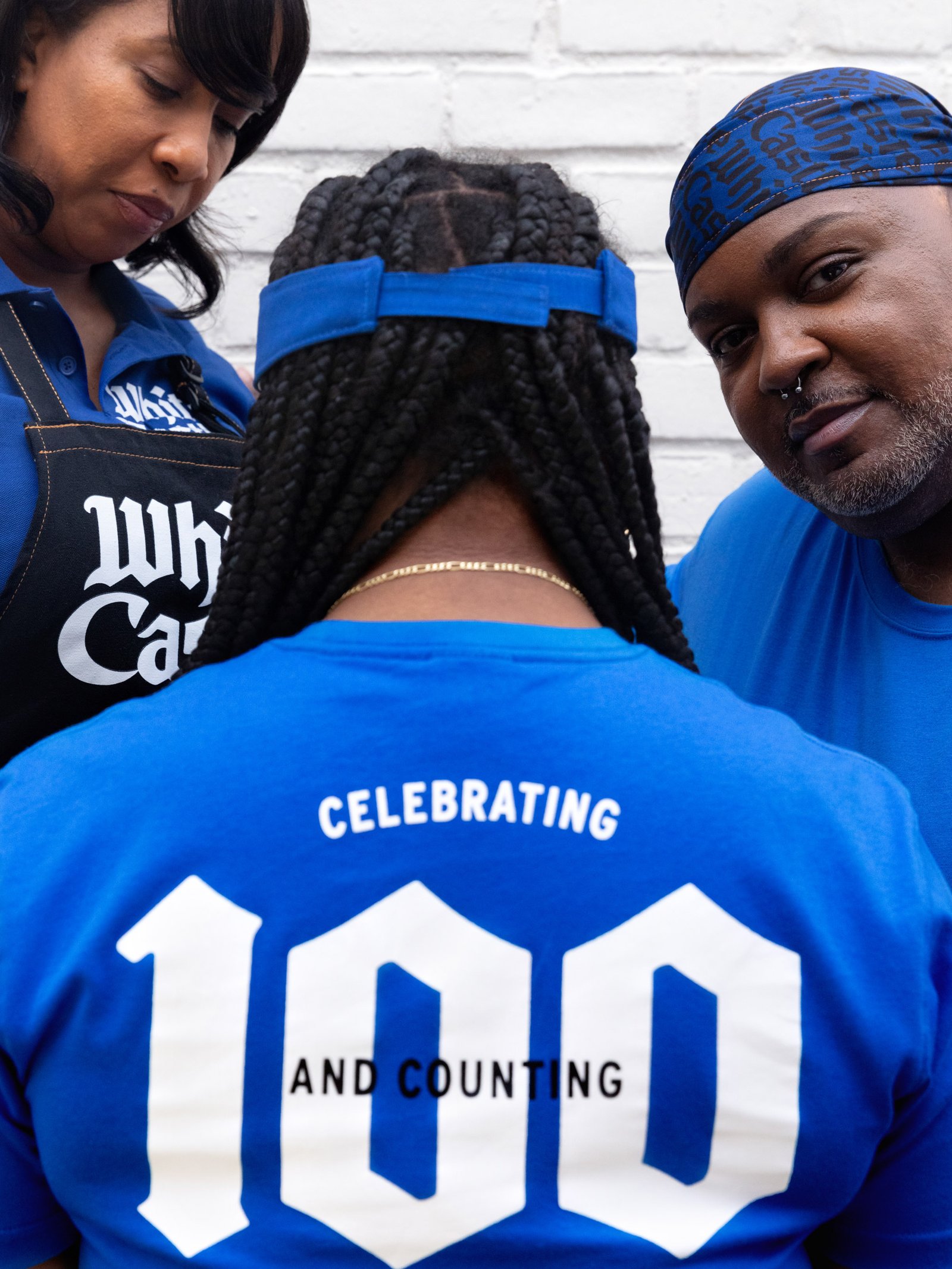Marcus Brutus paints present scenes with past inheritances
The NYC-based artist sits down with close friend and musical artist Tony Thames to talk adaptability, success and moving on from 2020.
This story was originally published in Justsmile Issue 1 FW20.
Photography Don Brodie
Text Erin McFadyen
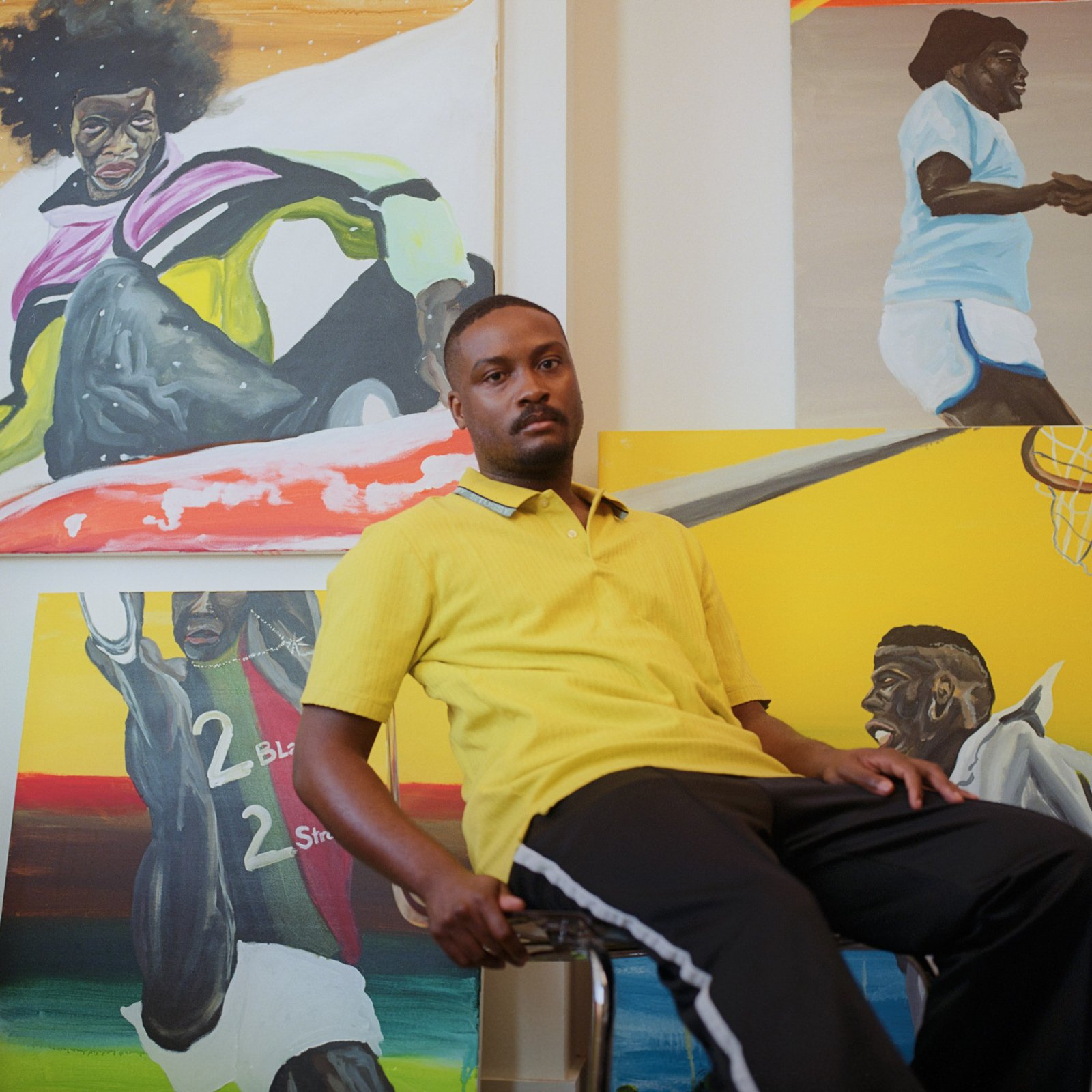
For the title of a recent solo show, Marcus Brutus went to Toni Morrison. The exhibition ‘Go To Work, Get Your Money and Come Home, You’d Don’t Live There’ takes its name from the advice Morrison’s father gave her as a teenager about to enter the labor force. This kind of engagement with Black cultural and social histories is typical of Brutus’s work; the artist paints scenes of the present soaked through with inheritances from the past. He’s interested in the ways in which Black life carries on — vibrantly, intelligently, subversively — in the infrastructure left behind by the struggles of the past.
Interested especially in the notion of ‘cultural dexterity’ — the ability to survive in one’s surroundings by adopting the requisite behaviours, gestures, and manners for that setting without losing sight of or attachment oneself — Brutus asks about the vexed relationship between personal expression and the performance of public personae. He’s interested, ultimately, in the idea of legacy: both examining what a legacy is and what specific legacies are, and in participating in the propagation, the extension, of his cultural past.
A self-taught painter with a degree in public relations from St. John’s University, Queens, Brutus is an intuitive and sensitive storyteller. For Justsmile, he speaks with Musical artist, Tony Thames.
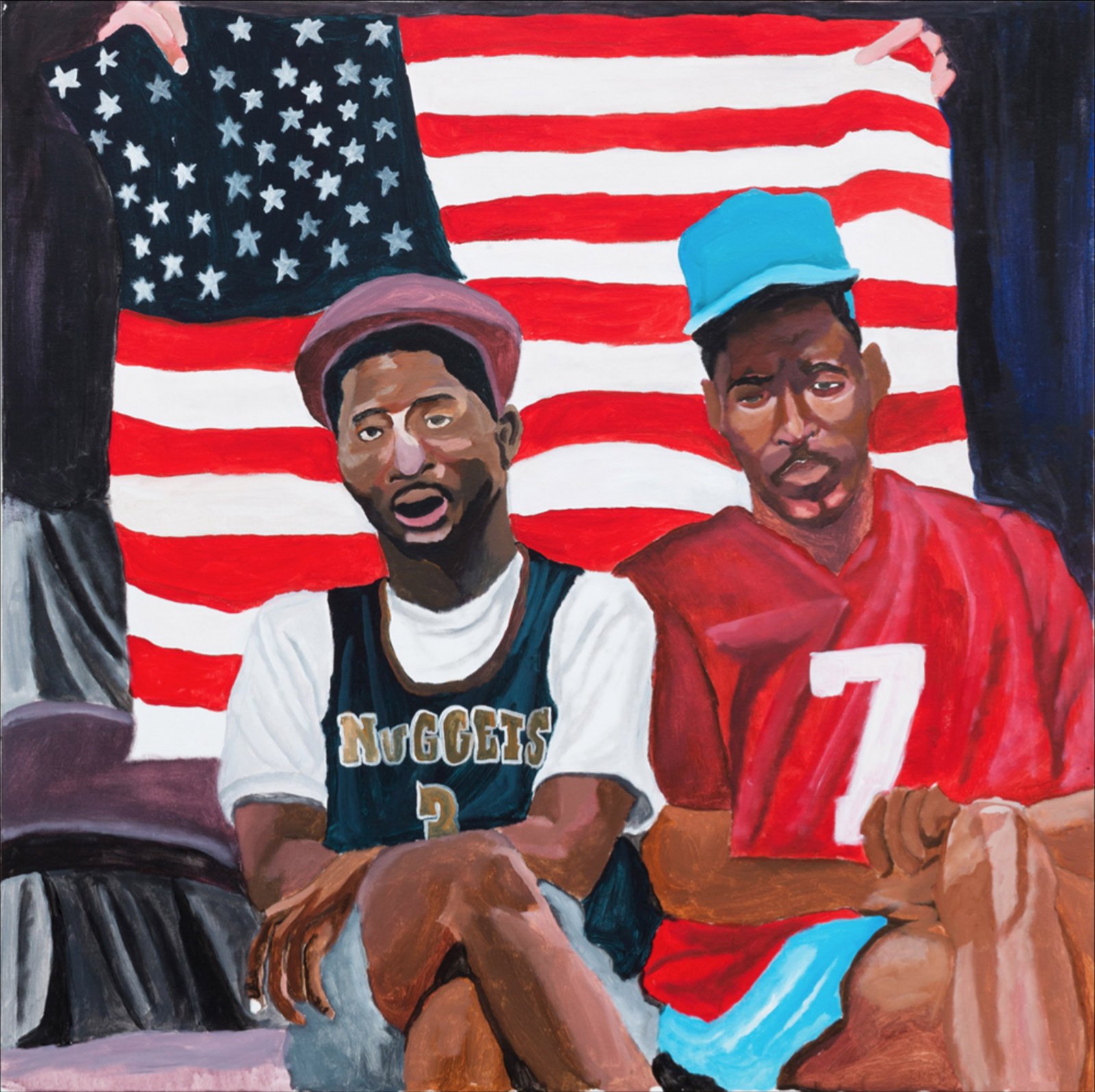
Marcus Brutus 'The Uhmericans' 2018, Acrylic on canvas, 30 × 30 in, ℅ Harper's, New York
‘I was really into basketball sneakers, and the people that I thought looked cool on the street. I remember being in church or at school, I would just make drawings of these people.’
Tony Thames: Alright, we are rolling. It is time to do the talking bro. Tell me about your beginnings, how you started in this art thing.
Marcus Brutus: I started creating works. After just years and years and years of just observing, just watching the world, being a visual person, and then leaning towards the fact that I felt like I knew best in a very visual way. And that kind of took on many different iterations, or stages. Initially, I used to just randomly save folders and folders and folders filled with images, I remember that. I wanted to create something that gave me that similar feeling, then I would want to save my own work in these folders.
But I didn't want to do photography. I wanted to do something with a process, a physical material process, to it. That drew me to painting, which initially started with watercolors, or even before that I’d create things digitally on Photoshop and Illustrator and things like that. And then I was like, ‘I want more of a physical aspect to it, and a laborious aspect to it.’ So I started with the watercolors. And then from the watercolors, I went to paintings on canvas.
TT: I've told you this before, like, I can draw, right? That it was my thing as a kid; did you have any childhood aspirations? As a kid, did you excel in something particular?
MB: I never excelled in drawing or anything. But as a kid, I would make drawings of stuff I liked. I was really into basketball sneakers, and the people that I thought looked cool on the street. I remember being in church or at school, I would just make drawings of these people.
TT: And as this kid, who did you look up to?
MB: I guess, growing up it would have been my dad. How that translates into my practice would be the hard work aspect, understanding the hard work, but then also understanding the other things that you can't account for, really, and they kind of come out. My dad was someone that kept a large library, every week he'd have a new interest. Like, he has a pilot license, he has a motorcycle. He has all these different things that he's always doing. I think that translates well in how I approach my practice: I'm constantly pushing myself, trying to pull from different resources, different experiences, different sources of material that can inspire the work.
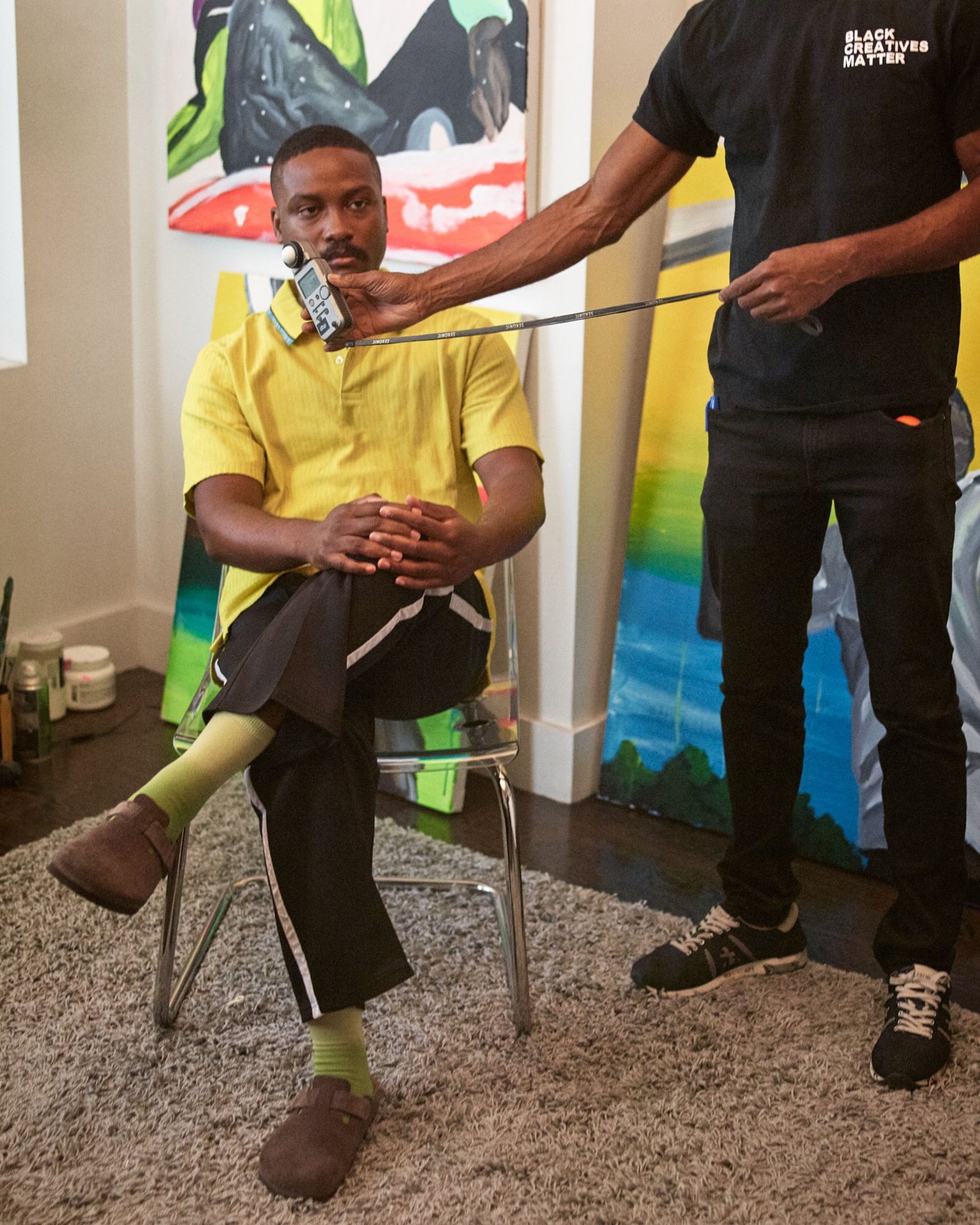
Marcus Brutus in his studio
TT: Here I was thinking that was going to be the boring question; you gave a fine answer. So, this year has been different, to say the least, more so with the COVID situation than anything, because we’ve both been very aware of all the other things. How has this year affected you and your journey? That's question one. And then I would like to know your outlook, whether it's optimistic or whatever, based on the happenings of the year so far.
MB: It has affected my outlook, because one thing that's a constant fixture in my life is reconsidering things that are a staple of my life. You know, we're inside for several months straight, you're not going out. It was the first time I questioned living in New York since I moved here in 2000. You know what I mean? You’re reconsidering the proximity, you’re considering being around so many people, being in a highly populated place.
So then I began to create scenes, or images, that didn't necessarily reflect in the immediate reality. That's where like, all the bright colors and things like that, juxtaposed with the figures [come from], because it doesn't really look like a standard image of life. It's the sort of fantastical depiction of life, because what I found myself doing, as many other people were doing, was being highly nostalgic of the past and very simple, everyday human experiences, like being in a concert hall, being in a nightclub being in a bar, and then also hoping that this will pass in a few weeks or a month or so. So that's kind of how it all sort of played on me.
I have a show coming up. And it influenced the title of the show, which is from that Alice Walker book of poems, Good Night, Willie Lee, I'll See You in the Morning. It's that after rain comes the rainbow kind of thought, sort of a very basic kind of way of thinking. But this poem in general, by Alice Walker, focuses on the idea of a bitter relationship in a woman's husband passing. Essentially, for her to continue on with her life, it's best to kind of forgive this person that has passed rather than holding on to all of the negative, or this sort of the bitterness of the relationship. And that's the only way that you can kind of move on, or that's the only way you can kind of relinquish the weight of that situation. Of course, forgiveness isn't the way forward in terms of dealing with COVID, but relinquishing that overwhelming anxiety that we have in terms of not being able to control, not being able to do the so-called ‘normal’ things that we always do, not being able to sit in a restaurant, not being able to hang out, or maybe see your family at times...whatever it is, the best way to deal with the situation is just to calm down and just listen to the different regulations and follow that. Just taking power of what you can control.
‘We're learning to move on from everything. It’s becoming unhealthy, because you even look at racial police violence, albeit it is intertwined with the election, and it’s being seen as temporary.’
TT: Have you interacted with, seen, or heard any art that kind of depicts the current times, especially these last seven to eight months, that you think will be important or relevant in the future? And I ask that because I despise any painting with a mask, any song like that. I don't know, I'm not saying that's good or bad. That's just how I feel today. How do you feel?
MB: Yeah, but I think I even felt like that before COVID. I think that we live in a, a super visual world. I love history. But what draws me to history and historical situations is finding something that's relatable, by relating history to now, because we're just bombarded with everything. Having so much information thrown our way...you engage with one thing, and it just automatically becomes completely dated. For example the Tiger King craze, or the toilet paper, or push up challenges, and all of this, it all becomes these viral moments, and then we're on to the next thing immediately, we just move on; we're learning to move on from everything. It’s becoming unhealthy, because you even look at racial police violence, albeit it is intertwined with the election, and it’s being seen as temporary. I think engaging with that has even slowed down and kind of been affected by the fact that people are just now just moving on from everything so quickly.
So actually, the things that I've seen that I that I've enjoyed, have been everything that helps me withdraw from the quick turnover of news. One of the highlights for me was The Last Dance, which was going back to look at Jordan's career history, rewatching TV shows – did you know Girlfriends is on Netflix? All these things that you could kind of rewatch bring you back to those times, and when you're looking back, they’ll probably bring you back to a happy time.
TT: What’s your favorite historical period to draw reference or inspiration from, that you've been actively engaged with in researching?
MB: It would probably be the 60s or just mid-20th century. I think that it's a critical period, where the changes that were made then are still ever present. But then again, you know, forever. The happenings in life have continued to influence the society in the world that we live in. But I'd say preferably the 60s.
TT: Gotcha. I agree with that, too. Ok, another open question, but it's so open that it’s interesting to me. What have you learned from failure?
MB: What have I learned from failure? That failure doesn't exist, because it's really how you interpret the situation. You can say, ‘well, I learned from this,’ or ‘now I've experienced this. So now I'm experienced in this particular situation, and I now have that, I have that much greater tools or information where I can learn. I'm going to reattempt this, but in this manner.’ So for me failure isn't real unless you quit.
TT: Bars. What have you learned from success? If you've ever seen it, have you seen it?
MB: Successes, they're only small victories in life; it's about a greater journey. It's a process. Never overlook any sort of achievement but don't be over consumed by it either.
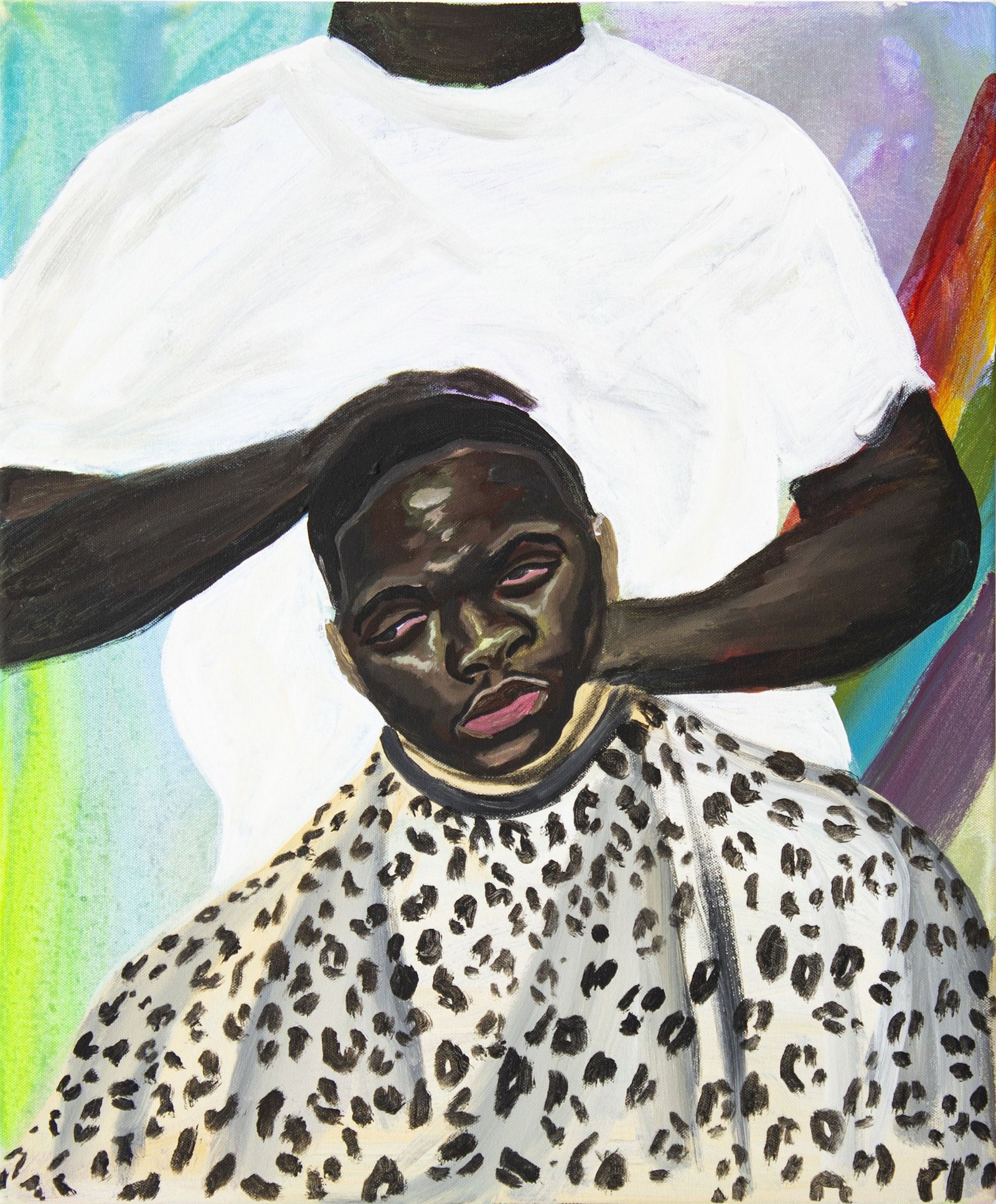
Marcus Brutus 'Line-up' 2020, Acrylic on canvas, 24 × 20 in ℅ Harper's, New York
TT: Yeah, I think the most important thing for any level of success is to not be consumed by it; don't be impressed with yourself ever. Almost ever.
MB: It's like, then you're stuck there. Yeah, that becomes you, that becomes that becomes your ceiling. I mean, listen, you should celebrate things. But you should always look at the bigger picture; you sometimes need to step back to look at the effort that it took to achieve something, or to congratulate yourself for the work that you did to accomplish something. But yeah, that shouldn't be completely consuming.
TT: What do you want next year to look like? You can answer that on a personal level. And if you care to, you can answer that on the level of when you look outside your window.
MB: Honestly, personally, I would just like an honest control of the virus. It’s great to acknowledge your strength and resilience to deal with a situation but I don’t glorify strength and resilience. I would rather not be in this particular situation.
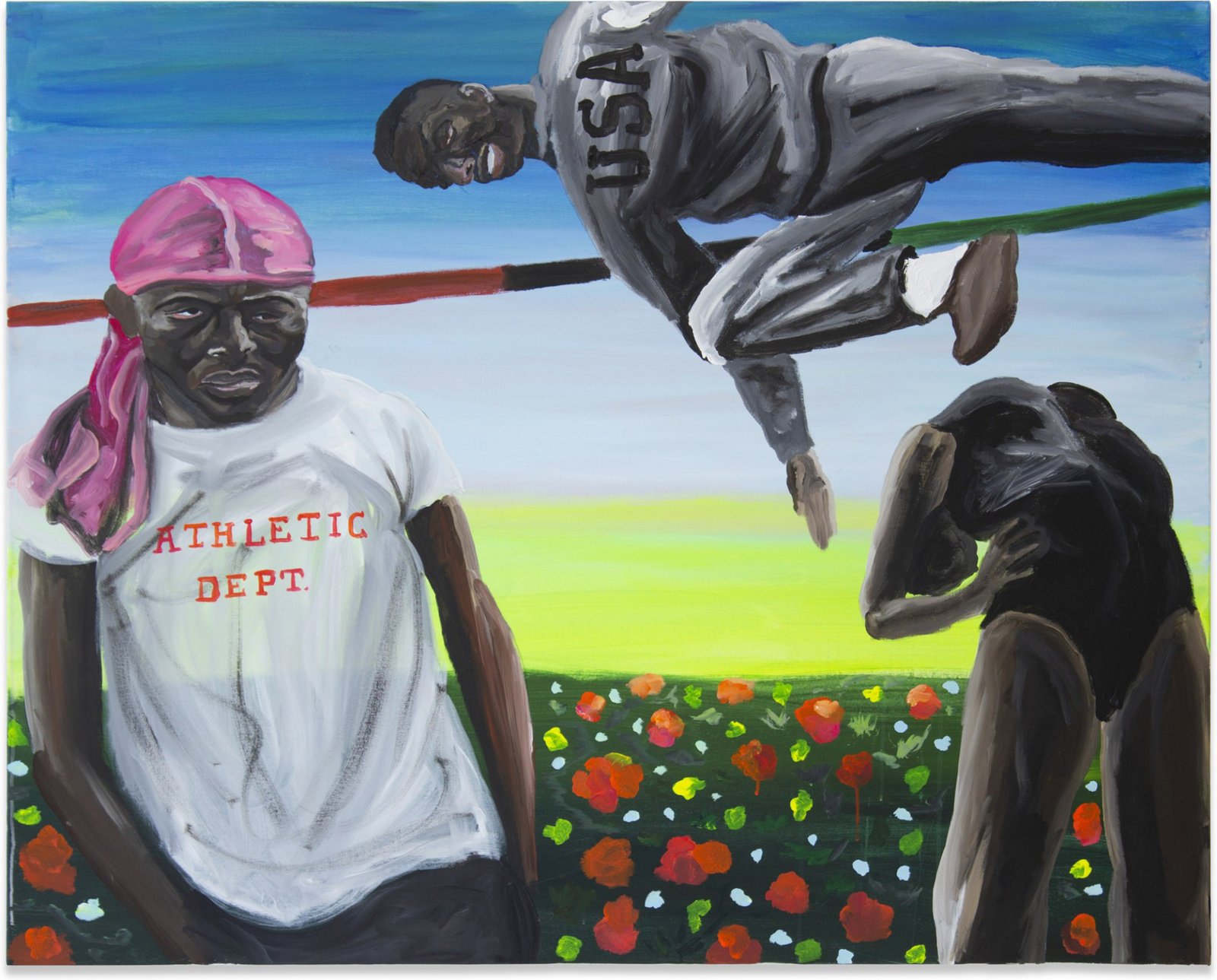
Marcus Brutus 'Black Athlete Bouillabaisse', 2020, Acrylic on canvas, 48 × 60 in ℅ Harper's, New York
TT: I have a hope that’s especially for artists; you know, there's different levels of caring, or everybody goes about it differently. But for the people that care like you, it's your livelihood. To me, I really hope those people get a chance to, like you said, think about everything: why should I be living here? Should I be doing this? I think that's the really important takeaway for everyone, but in particular, for the sake of this conversation, artists.
MB: Yeah, is it. And another thing. Talking to you beyond our friendship, talking to you throughout [the year], we have a somewhat similar temperament, or way of dealing with certain situations. I would rather discuss things with you, whether they're happy or sad, or, you know, however, because we just have a different way of dealing with things. One of the great things throughout [the COVID lockdown] was that we would speak once throughout the week, have a two hour conversation similar to this one. And then that would guide us for the entire week, where we didn't have to speak again, but we're just on it, because we got that release.
And so that might be something that kind of remains; if we get beyond this, if the world opens up, if people are busy, is to find that way to find that release, find that outlet, because sometimes that may not be directly in the work. I remember, around George Floyd, I couldn't work that couple of days, for a week. I was completely down and I couldn't, and I stuck to the news or stuck to social media; I was glued into it. So I had to find other ways of dealing with that because painting wasn't that for me at that time at that time. And sometimes it's just falling back and just kind of letting go of everything. I think that was that something that I've learned as well like throughout this whole thing, this whole period.
TT: That seems to be the thing we keep coming back to though, and that's a takeaway, a positive takeaway, not just for 2020 but I think for anyone who reads this: it’s better we learn to let go of certain things sooner than later in order to become the best version of ourselves: on an artistic level, on a personal level. It’s something that you can learn in any year, but this year is forced upon us.
